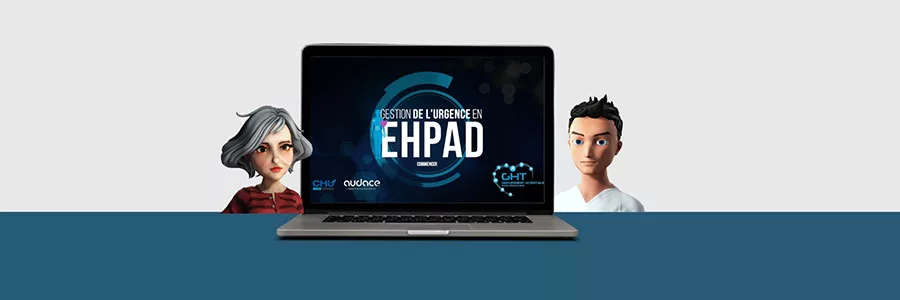The GHT Rouen Cœur de Seine wanted to train healthcare professionals in emergency management in EHPADs and the different treatments available in healthcare establishments. The training had to reflect the reality on the ground and take into account the specificities of the territory while being as engaging as possible.
Two serious games to train in the care of elderly patients
To meet the specific needs of GHT Rouen Cœur de Seine, Audace has developed two training modules in the form of serious games. These training programs were developed for healthcare professionals working within GHT Rouen Cœur de Seine, including home care assistants, medical-psychological assistants, nursing aides, nurses, rehabilitation specialists, and healthcare managers. Each module consists of three scenarios plunging learners into critical situations that they must resolve.
Interactive and immersive learning through serious games
The first module, entitled “Emergency Management in EHPAD” is described as a 3D guided game, followed by a procedure (step by step) for identifying signs of seriousness of an urgent nature. The learner moves around in the medical environment and patient rooms. He interacts with the personnel around him. A rest room has even been set up!
Scenario : You start a new day at the EHPAD, Résidence des 4 vents, and you visit Madame Fleutain, your patient who was tired yesterday when you left. Today she doesn’t feel well. It’s up to you ! What treatment, what examination should be done to ensure Ms. Fleutain’s condition? Be careful, a wrong diagnosis can worsen your patient’s condition!
For the second module, Audace divided the training into three pathways:
- The failure of the caregiver, of those involved in the city and at home,
- The psychiatric journey,
- The link between EHPAD and hospital
Here, the serious game presents itself as a board game. The player advances his pawn and must solve challenges presented on the squares of the board. The first boxes allow him to discover the context. The learner then encounters an event, a challenge on the next box which he must then resolve. To help him make the best decisions for his patient, clues are provided to him in the form of cards representing actors (doctor, patient’s family, patient, etc.).
Each journey has its own patient, its own situation and a unique scenario.
Example scenario: Mr. and Mrs. Bauldeupa are a childless couple with a relatively high financial situation. Mr. Bauldeupa suffers from a loss of autonomy, diabetes and osteoarthritis. The couple manages alone and only has an IDEL to help them take insulin… But one day, Mme. Bauldeupa has a stroke. The challenge is on! Who to warn? Que faire ? Quelle prise en charge financière pour le couple ?
The player must use the information provided by the cards to make the right decisions!
Serious games offer two learning modes:
- A “training” mode with unlimited attempts to allow learners to practice and correct their errors,
- An “evaluation” mode to measure the skills acquired. Here, the learner is only allowed one attempt and cannot start again in the event of an error. He obtains a note at the end of the situation played, a note which is transmitted to the trainer.
These training programs offer learners the opportunity to learn at their own pace and assess the skills they have acquired. Immersive and interactive, they allow you to live a practical and realistic experience. Learners can move freely in virtual environments faithful to reality, interact with patients and those involved in the care pathway, and make decisions that have an impact on the progress of the game. This allows them to understand situations, requiring rapid and effective patient care, that they encounter in reality.

